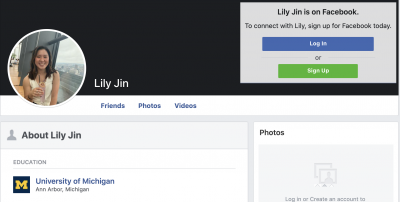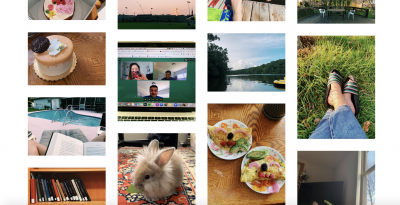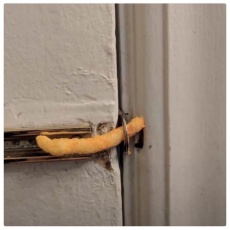Lily Jin
Contents
Introduction
My first awareness of having an internet presence perceivable to others was in early middle school. I had stumbled upon Instagram on the App Store while playing around with my first exciting new piece of technology, an iPod Touch, and downloaded it thinking it was simply a picture-sharing app. My first and only followers were my best friend at the time and my sister and my username was ‘lilyjinstagram’. Assuming this was the extent of my audience, every post I uploaded was a photo of my cat. Reality hit when someone from my school followed me. When I visited her profile, I discovered that many of my other peers were also on the app and to my surprise did not use it purely to spam two close friends with cat pictures. I quickly realized Instagram was not meant to be an intimate extension of my camera roll like I had originally thought, but instead a medium that people used to portray the best version of their lives. Needless to say, I promptly deleted all of my cat posts and changed my handle to something I thought was less cringe.
I tell this story because it reflects two themes of internet engagement I still wrestle with today: whether I really want a virtual portrayal of myself to exist for anyone to find (albeit, carefully curated), and a struggle to accept the actual publicity and reach of anything I put online. Digging for information on myself from a third-party point of view has forced me to confront the fact that not only is there a pretty representative depiction of myself on the web, but also that it’s only a few clicks away.
Searching for Myself, Private Investigator Style
I decided to take a more methodical, breadcrumbs approach to Googling myself by piecing together an online profile with only information slowly revealed by subsequent searches. In doing this, I wanted to tackle head-on the themes aforementioned-- how high up my information would be shown (thus how easily I could be found) and how complete of a profile could be put together. I was especially curious about the second factor. I anticipated that finding basic information on myself would be a given provided that we live in the Digital Age, but I wanted to see how much implicit information one could gather knowing nothing about me. How close you could really get to knowing who I am as a person without ever having to meet me.
Basic Information Search
A Google search of my full name reveals a profile of a doctor whose first name is my middle name. However, if someone were seeking me out specifically, they would easily see my picture next to the more famous doctor’s, and more disturbingly, a link with my permanent address listed next to the name ‘Rona Jin,’ identifying my parents and me as relatives in the text beneath. I wasn’t surprised that this information was publicly available, rather, it shocked me that it was right there on the first page. I had always operated under the assumption that I was relatively hidden on the internet because of numerous other Lily Jin’s that were older, more established, more accomplished, and thus being more worthy of having a prominent online trace than I did. My relative insignificance to them meant that I was happy living in my little corner of the internet while being shielded by their online presence. However, a simple initial search announced where I lived, the names of my immediate family, and a fairly recent photo of what I looked like-- with the key to unlocking this being my unique middle name.
Using a data broker site, similar basic information popped up about me. Although if someone had the same idea as I did to look through my parents’ pages to fully take advantage of Instant CheckMate’s $1 trial, they would also be able to find my phone number, the make and model of the car I drive, and how much our family house cost when it was bought. What surprised me the most was how much implicit information one could yield from this Zillow profile of my residence. By seeing what kind of neighborhood I lived in and which schools nearby that I went to, anyone could figure out my socioeconomic status as well. This was eerily significant to me because SES is a pretty accurate predictor of someone’s life trajectory-- what colleges, jobs, and other opportunities they’ll be exposed to. Not only was information about my past and present available online, but also what my life could potentially look like in the future too.
Puzzling Together My Online Persona
With my key information found, I proceeded to tack on various social media sites next to my name to see if one could enrich my basic online profile by putting together a picture of my personality as well. Searches for Facebook and LinkedIn bring up two more recent photos of me but only reveal that I attend the University of Michigan and am from the greater Detroit area (the latter seems unimportant now that I know my home address is explicitly stated on the front page Google results for my name). Armed with information of my current education, searching ‘umich’ next to my name yields the staff page for the Michigan Yearbook that lists my position and another unique photo of myself. I was also surprised to see that there were multiple links to individual tweets I had posted all with the keyword ‘Michigan.’From my Twitter, you can tell that I’m roughly in line with people who have the same demographics as I do: a Gen Z college student. Judging by a quick scroll, you can get a pretty good idea of my sense of humor, political views, personal values, and some of my interests. Although I personally don’t tweet very frequently, my retweets form a narrative with dumb observational comedy, slam-dunking on political figures such as Ted Cruz with scathing jokes, and the normal anxieties of a young adult navigating a fast-paced society. My bio even lists my height as the punchline to a joking statement about myself. I wouldn’t go so far as to describe my Twitter as a diary, but it does give a solid sense of who I am, or at least the good parts of myself I have no issues with projecting to the public.
Even though I actively participate on a site that can oftentimes be a raging trash fire, I do think I have an increased sense of hypervigilance on what I post on social media. Since I have teachers, coaches, and younger relatives who follow me, I’m careful of what I put on my profiles and keep all of my content PG and fairly school or work appropriate. While I like to think I have a good control of self-generated image, I again didn’t expect to see my small account as the third hit from a name and school search.
A search for my Instagram brings my account as the top hit (as you can guess by now this also surprised me). While my account is private, my profile tags two organizations I’m involved in on campus and displays a link to my VSCO, a photo editing and uploading platform that’s purpose is reminiscent of what 13-year-old me initially thought Instagram was like. Although this practice of keeping a private Instagram with a link to a public VSCO is common among people my age, it essentially leaves my page a paradox of opposing privacy measures. Instagram is known to be heavily edited, curated, and publicized, making me much more selective with the photos I post. However, I use VSCO as a personal scrapbook that is dedicatedly appreciative of the small things, moments, and people in my life. The fact that the former is private while the latter is not reflects my hypocritical nature of a desire to engage in the alluring services and community of the internet while also wanting to keep a low profile to the general public.


